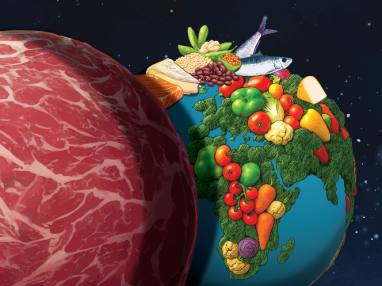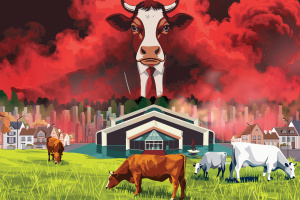Misinformation threatens major report on diet for health and climate

New research exposes meat industry efforts to distort the science
The meat industry is preparing to undermine a major scientific study on diet being published next week, analysis and leaked audio recordings suggest.
A group of online ‘misinfluencers’ [1] has been identified by the environmental non-profit Changing Markets Foundation that it fears will attack a Lancet study with mis- or disinformation around the time of its publication on 3 October.
The group was at the heart of a “ferocious” backlash to a first iteration of the study, which recommended the world eats less meat to protect human health and the planet. The backlash included misinformation, conspiracy theories and personal attacks on the scientific authors and contributed to the World Health Organization cancelling a supporting event.
A PR agency working for meat, chemical and tobacco firms, Red Flag, celebrated the backlash as a “remarkable success”, though the extent of industry involvement remained unknown. The Changing Markets investigation breaks new ground by creating a heatmap of the online backlash to identify the most influential voices. Together with fresh evidence of industry planning, the investigation sheds new light on the degree to which the backlash was orchestrated and has become a template for possible further attacks [2].
Audio recordings from a secretive conference sponsored by the meat sector [3] suggest that next week’s “major scientific update” to the Lancet study will come under attack. Figures behind the original backlash organised or spoke at the recent closed-door conference in Denver, USA, historically known as Cow Town. The conference agreed on the need for an “urgent” global communications and lobbying campaign “using all contemporary channels” [4].
This campaign won’t be based on science alone, audio recordings of the Denver conference suggest. Red Flag gave a “pre-summit workshop” and the conference featured numerous public relations gurus and paid lobbyists. One industry consultant is heard urging delegates to recognise that “scientific facts are not as critical as ‘who you are’” and that “truth is a relative concept.” [5] Another delegate openly badmouthed leading scientific researchers as “annoying” people that you would not want to eat dinner with [6]. One presenter acknowledged that “this is not a scientific conference.” The value of online influencers was recognised repeatedly.
It is not clear whether the planned communications campaign will target the Lancet update or be longer term. But the sector sees the Lancet update as a threat [7]. One PR guru told the conference that significant profits lay ahead if the sector can avoid “social control” and regulation, for which communications is critical [8].
Nusa Urbancic, Changing Markets CEO, said: “Our research shows more clearly than ever that the meat industry is increasingly fighting science and progress with misinformation and dark online forces. With the web becoming lawless and AI tools rising, online misinfluencers we identified are more powerful today than ever before. We’ll be watching them closely next week for signs of another backlash. At this critical moment, the scientific community and policymakers must be aware of those working overtime to slow progress to better health and environmental protection. This is a fight we cannot lose. We can all resist them better if we understand who they are and what they are doing, hence our investigation.”
EAT-Lancet 2 will be published in a more hostile environment than in 2019. The reach of many of the mis-influencers identified by Changing Markets has grown and the public acceptance of their ideas has increased. X downgraded its misinformation reporting feature to a community notes system in 2023, while Meta ended its third-party fact-checking programme this January. AI further enables bad actors to generate more content, more tailored and increasingly convincing. Protein is trending among health and wellness influencers, while climate action has fallen down the popular agenda. Conspiracy theories are now “central forces shaping public opinion and political discourse worldwide” driven by the digital transformation of information, according to the Harvard Kennedy School.
Ends
The report, MEAT vs EAT-Lancet, is available here. The Denver audio files are available on request.
Notes
[1] The group is made up of industry-friendly scientists, health influencers, pro-meat doctors, journalists and authors. A summary of the influencers, their links to industry and likely financial motives is available here. The report profiles 13 in detail, see Section 4.
[2] The report establishes for the first time:
- The centrality of meat industry champions in leading the backlash. Obscure academics Frédéric Leroy and Frank Mithloener generated the 4th and 6th most engagement of any posts critical of EAT Lancet. Changing Markets identified a pattern of consistent tagging between the top 20 mis-influencers, who generated 69% of all backlash post engagement. See Section 3 of the report;
- The possible identity of the journalists, think tanks, and social media influencers directly briefed by Red Flag just before EAT-Lancet launched. Given how pleased the agency is with the campaign, it is reasonable to assume they are central to Changing Markets’ heatmap;
- That a few months before EAT-Lancet, the North American Meat Institute mobilised the “dietitian community” – see page 30 of the report. These may be among the diet and health influencers who feature prominently in the top 20 The institute works closely with Red Flag;
- That the industry-backed hashtag created to oppose EAT Lancet, #Yes2Meat, was the “official opposition”, suggesting a greater degree of industry coordination than was previously known. See page 18 of the report.
- The existence of an obscure interview with Mitloehner’s industry patron, Joel Newman, published soon after the backlash, in which he reportedly confirms the formation of a coalition to “dispel” the EAT-Lancet recommendations, a collaborative effort that “needs to happen more often”. He describes social media as a “huge change factor” for agribusiness as it tries to push back on plant-based diets.
[3] The conference was subsidised by the taxpayer, meat companies and industry groups, who wrote enthusiastic letters of support, citing the need for a communications project. Critics were refused entry, to allow “an open exchange”, while an industry-sponsored networking event was deliberately kept off record. Meeting records of academic aspects were published afterwards, while most of those on branding, communications, public relations and lobbying were not. See report section 5.2.
[4] Two Denver organisers noted: “It was agreed that, as a matter of urgency, a coordinated strategy to amplify the science using all contemporary channels and lobbying was essential, linking with international stakeholders to achieve maximum cut through with uniform global messaging for customers and policymakers.” Also the “strong agreement” that scientific evidence ‘is a poor cousin of personal belief” when it comes to public communications. Action to be taken included: “existing proven high impact communicators in health, nutrition, environmental and societal subjects be incentivised to expand their output through existing and additional channels.”
[5] A Peer Ederer comment during the discussion of Session I: Health & Nutrition. Audio available.
[6] One speaker expressed open disdain for leading scientific institutions, saying “those fancy people at Harvard, fancy people at Tufts… some of those people, they’re oftentimes, they’re both annoying, just their public statements, but even imagine sitting down and eating with them.” Audio available.
[7] A slide describing the EAT-Lancet update as a “challenge” is presented at a conference in August 2025, co-chaired by Frédéric Leroy (pictured walking at the rear). Leroy is a leading academic defender of meat and the creator of a website with the stated aim of “defending livestock and animal-sourced foods”. He is known for cowriting pro-meat “industry propaganda” to lobby EU officials. See his profile on page 31 of the report.
[8] Summarised from a PR expert with the Look East agency (which “helps agribusinesses maintain their social license to operate with consumers”) during the ‘Trust, Science, and Global Considerations for the Societal Role of Meat and Livestock’ session. Audio available.
Contacts
Nusa Urbancic, CEO, Changing Markets Foundation (EN, ES, FR), nusa.urbancic@changingmarkets.org
Maddy Haughton-Boakes, Senior Campaigner, Changing Markets Foundation (EN), maddy.haughton-boakes@changingmarkets.org
Jo Kuper, Communications Director, Changing Markets Foundation (EN), jo.kuper@changingmarkets.org
Jack Hunter, Changing Markets Foundation communications consultant (EN),
jack@fthe.fr
You might also like...

The New Merchants of Doubt: How Big Meat and Dairy Avoid Climate Action
This report reveals the tactics of Big Meat and Dairy companies to delay, distract, and derail action on transforming the food system, mirroring strategies used by the tobacco and fossil fuel industries.

Big Meat and Dairy’s Narratives To Derail Climate Action
Big Meat and Dairy companies are deploying ‘narratives’ in advertising, PR campaigns, and lobbying that paint the industry as greener than it really is and frame the stakes as too high to change. Like many p...

The Meat Agenda: Agricultural Exceptionalism and Greenwash in Brazil
As Brazil prepares to host the 30th conference of the parties of UNFCCC (COP30) in heart of the Amazon, the country is positioning itself as a global climate leader with ambitious emissions reduction targets...